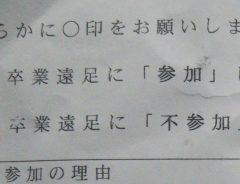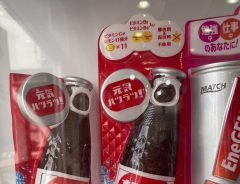- Tags:
- Japanese politics / mistake / political gaffe
Related Article
-

Japanese teacher unwittingly lays a trap in a graduation field trip participation survey
-

Japanese vending machine stubbornly refuses to sell hot cocoa, with hilarious results
-

Japanese vending machine perplexes passers-by with promises of “hot soda”
-

Beware of these noodles! Frequent visitor and influencer has warning for people going to Japan
-

Japanese student uploads embarrassing picture by mistake
-

Japanese man posing for ID photo sneezes with hilarious results



We’ve all done it before: minced words, made a Freudian slip, failed to think out the implications, or simply been too honest. You can take it from me, an expert on the issue. When you say something stupid, kick yourself, quickly move on, and hope no one noticed.
For us plebs, who knows, maybe we can get away with a dumb idea or comment every now and again. Politicians, on the other hand, are under a lot more pressure to be polished in speech. I, personally, can understand why. For example, when former US president George W. Bush made one of his “Bushisms” (“They misunderestimated me") I took particular delight. I'm sure others partake in such schadenfreude.
While American politicians make more than their fair share of gaffes and controversial statements, the problem is clearly universal. Japanese politicians have the same affinity. In fact, it's so bad that political parities have distributed anti-gaffe guides to prominent politicians.
With that in mind, let's take a moment to hear what officials have to say.
Women Are Too Indecisive to Grocery Shop
Osaka Mayor Ichirō Matsui recently fell under fire after telling reporters that men should do all the household shopping during the COVID-19 lockdown. The mayor believes that women "take a long time as they browse around and hesitate about this and that." Matsui continued, "Men can snap up things they are told (to buy) and go, so I think it's good that they go shopping, avoiding human contact."
While issues of equality are an ongoing battle in Japan, this kind of chauvinism is, unfortunately, far from rare. In their coverage of the incident, the Jakarta Post discussed the online firestorm that occurred following the remarks. Twitter users accused Matsui of being "full of prejudice against women," while others derided his out-of-touch thinking.
Hitler Was “No Good, Even If His Motive Was Right.”
In 2017, Finance Minister Taro Aso faced severe backlash after expressing admiration for Adolf Hitler. In a meeting with LDP colleagues, Aso related that “Hitler, who killed millions of people, was no good even if his motive was right.”
The US-based anti-semitism watch group The Simon Wiesenthal Center lambasted the politician, and the Finance Minister was quick to walk back his remarks: "It is clear from my overall remarks that I regard Hitler in extremely negative terms, and it's clear that his motives were also wrong." Rather than defend Hitler, the politician claimed he meant to underline the importance of achieving results.
And he certainly couldn't have chosen a better example.
Nevertheless, Aso is no stranger to hot water. At other times, he has drawn criticism for saying he wanted to make Japan a country where "rich Jews" would want to live, and for praising Japan for having "one culture, one civilization, one language, and one ethnic group."
"Nuking" A Reporter
In 2011, Yoshio Hachiro made an epic—and career-ending—bad joke. After visiting Fukushima amid the nuclear power plant crisis, he rubbed his protective gear against a journalist while joking "I'll give you radiation." In an earlier incident, he was criticized for being insensitive after describing a tsunami-hit area as a "town of death." Before his visit, residents had escaped the region as a nuclear power plant meltdown released huge amounts of radiation.
Although Hachiro was quick to apologize after the incidents, the public response was unforgiving. The Prime Minister at the time was also forced to apologize for backing Hachiro and distance himself from his appointee. Unsurprisingly, after the radiation suit incident, Hachiro quickly resigned.
Drunken Confidence: War with Russia
Nippon Ishin no Kai lawmaker Hodaka Maruyama, a House of Representatives member, had a relatable problem. Being a little too tipsy, a little too confident, and little too war-hawkish.
It happens to everybody.
In May 2019, Maruyama accompanied a group of about 60 people to the Russian-controlled Kunashiri Island near Hokkaido. While drinking with the group, he asked the tour leader "Do you support, or oppose, getting back [an island taken by Russia] by war?" He later went on to suggest, "Is there any way (to resolve the problem) if we don't have a war?"
Once his comment hit the wires, government officials were quick to condemn his off-the-cuff remarks. Even Osaka Mayor Ichiro Matsui, the mayor who thinks women are too indecisive, was upset. He chided Maruyama's remarks as "inexcusable" while asserting the lawmaker endangered diplomatic efforts. Other prominent politicians went on to lament Maruyama's remarks, and he was eventually expelled from the party.
A Piggyback over A Puddle
The former vice-minister of reconstruction was all but publicly flogged after visiting Iwaizumi, a town devastated by a large typhoon. Pictures surfaced of Shunsuke Mutai piggybacking on a subordinate while crossing a puddle. According to reports, the vice-minister had requested the piggyback while laughing and joking with residents. Prior to his visit, nine people had died in the storm.
Criticism was broad and harsh. Some went as far as to brand Mutai as “the shame of Japan.” Mutai apologized, acknowledging that his actions were inappropriate. However, years later, in 2017, he was forced to resign after joking that "the rain boot industry made a lot of money" over the incident. Apparently, he hadn't learned his lesson.